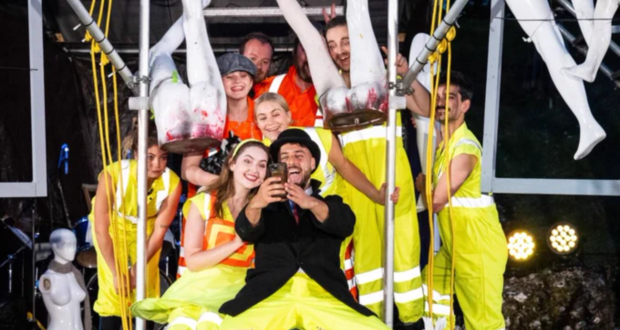Unconventional and bizzare, with a powerful political message as it deconstructs society.Summary
Rating
Good
The Threepenny Opera was written by Bertolt Brecht in 1928 and is considered one of the first-ever musicals. Not knowing what to expect, the The Rocky Horror Picture Show came to my mind the minute the first act started. This production is bizarre, kaleidoscopic, and unconventional to say the least.
The panoramic seating arrangement around the stage gives the audience excellent views from every position, but the downside is the dialogue doesn’t carry when the cast are not facing outward. The orchestra, who are both talented actors and musicians, are spread out amongst the first tier of the audience, with the conductor Lada Valesova bouncing around the stage to add to the quirkiness. The central stage with a circular platform has multiple purposes. It cleverly transforms from being the conductor’s podium, to an abattoir for Macheath and Polly’s wedding breakfast, then a brothel with parts of mannequins strung up around it to make it look like a scene from a Damien Hurst exhibition, and finally into a prison cell where Macheath is held.
The outfits are all high-viz of varying lengths and accessorised to distinguish each character. Is this a deliberate choice to perhaps reflect on the blue-collar community, and not the grand costumes of higher society? Perhaps, but it goes to highlight that this is no ordinary musical or ‘opera’. It is the antithesis of the hallmark story of boy meets girl or even the romantic tragedy of Romeo and Juliet. Instead, this is set in the grimy, gritty underworld of London in the 1920s. We are introduced to two unscrupulous men, Mr Peachum (Mark Carlisle), who runs a gang of beggars, and the notorious pimp Macheath (Peter Watts). Watts enters the stage to the tune of Mack the Knife, which jauntily pays homage to his attributes and horrific misdemeanours. He is charismatic and holds his many women (and the audience) in the palm of his hand.
A turf war ensues between the two, as Macheath marries Mr Peachum’s daughter Polly (Emily Panes) in secret. Polly is eerily convincing in her cheerful naïveté, and in full support of her new husband, and yet we slowly witness the heart of a calculating dame being revealed. It’s a drama with ugliness, backstabbing, and malicious intent, disguised with cheery dark humour and artsy yet blindingly garish costumes.
The scene that resonates the most is when two of Macheath’s women have a ‘meeting’, which switches from a ‘no holds barred’ argument between fishwives into an Austenesque tea party with a scathing yet politely structured verbal sword fight. This switch of scene is the most poignant, as it brings to light the primary message of the play and the hypocrisy of a capitalist society. The director punctuates this anomaly with a flick of the control panel by the ‘inventors’ (Faith Turner and Carlisle) and lights flash on and off, to articulate the quick scene change.
This play is one that needs time to percolate, as during the whole production I was confused no end. The first half of the act is ninety minutes long, and it is obvious that the audience felt every minute of it. The point, if we are to understand Brecht, is to make the audience uncomfortable: to come face to face with the true underbelly of society. Perhaps this point could have been made in a shorter time period, as it is the second act that serves to deliver the political message attacking capitalism and its hypocrisy, focusing on a proletarian society where money and power could change the outcome … if only they had any.
Written by: Bertolt Brecht (text & lyrics) and Kurt Weill (music) in collaboration with Elisabeth Hauptmann
English translation of the dialogue: Robert David MacDonald
English translation of the lyrics: Jeremy Sams
Directed by: Adam Nichols with Julia Mintzer
Musically Directed and Conducted by: Lada Valesova
Produced by: OVO
The Threepenny Opera plays at Cockpit Theatre until 8 October. Further information and bookings can be found here.
 Everything Theatre Reviews, interviews and news for theatre lovers, London and beyond
Everything Theatre Reviews, interviews and news for theatre lovers, London and beyond



